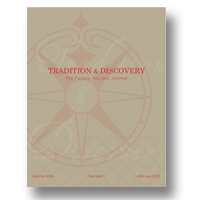|
|
|
1.
|
Tradition and Discovery: The Polanyi Society Periodical:
Volume >
30 >
Issue: 2
Preface
view |
rights & permissions
| cited by
|
|
|
|
|
|
|
2.
|
Tradition and Discovery: The Polanyi Society Periodical:
Volume >
30 >
Issue: 2
Information on Electronic Discussion Group
view |
rights & permissions
| cited by
|
|
|
|
|
|
|
3.
|
Tradition and Discovery: The Polanyi Society Periodical:
Volume >
30 >
Issue: 2
News and Notes
view |
rights & permissions
| cited by
|
|
|
|
|
|
|
4.
|
Tradition and Discovery: The Polanyi Society Periodical:
Volume >
30 >
Issue: 2
Martin X. Moleski
Annual Meeting Minutes
view |
rights & permissions
| cited by
|
|
|
|
|
|
|
5.
|
Tradition and Discovery: The Polanyi Society Periodical:
Volume >
30 >
Issue: 2
2004 Polanyi Society Annual Meeting Call for Papers
view |
rights & permissions
| cited by
|
|
|
|
|
|
|
6.
|
Tradition and Discovery: The Polanyi Society Periodical:
Volume >
30 >
Issue: 2
Walter Gulick
Letters about Polanyi, Koestler, and Eva Zeisel
abstract |
view |
rights & permissions
| cited by
Illuminating letters by Barbara Striker and Bela Hidegkuti respond to Walter Gulick’s review of David Cesarani’s book, Arthur Koestler: The Homeless Mind in Tradition and Discovery 29:2 (2002-2003), 50-55. The letters and accompanying commentary shed light on the details of Eva Striker Zeisel’s USSR imprisonment and release, her relationship to Arthur Koestler, the lives of George and Barbara Striker (Polanyi’s nephew and wife), and the circumstances and sources of Cesarani’s biography.
|
|
|
|
|
|
|
7.
|
Tradition and Discovery: The Polanyi Society Periodical:
Volume >
30 >
Issue: 2
Information on Polanyi Society WWW Resources
view |
rights & permissions
| cited by
|
|
|
|
|
|
|
8.
|
Tradition and Discovery: The Polanyi Society Periodical:
Volume >
30 >
Issue: 2
Yu Zhenhua
Tacit Knowledge/Knowing and the Problem of Articulation
abstract |
view |
rights & permissions
| cited by
In this paper, I attempt to create a dialogue between the Wittgensteinian tradition and the Polanyian tradition concerning the understanding of the concept of tacit knowledge/knowing from the perspective of the problem of articulation. Norwegian philosopher Harald Grimen argues for a distinction between the strong thesis of tacit knowledge and the weaker theses of tacit knowledge. The former highlights the logical gap between our knowledge and our capacity for verbal articulation, which is not the case for the weaker theses. Inspired by this important distinction, I claim that there are actually two meanings of Polanyi¡’s concept of tacit knowledge/knowing. Finally, I try to bring out the relevance of the ongoing discussion on tacit knowledge/knowing to contemporary Chinese philosophy.
|
|
|
|
|
|
|
9.
|
Tradition and Discovery: The Polanyi Society Periodical:
Volume >
30 >
Issue: 2
Submissions for Publication
view |
rights & permissions
| cited by
|
|
|
|
|
|
|
10.
|
Tradition and Discovery: The Polanyi Society Periodical:
Volume >
30 >
Issue: 2
Percy Hammond
Personal Knowledge and Human Creativity
abstract |
view |
rights & permissions
| cited by
The keystone of Polanyi’s epistemology is his idea that tacit knowing integrates subsidiary knowledge and creates personal meaning. However, Polanyi’s preoccupation with scientific discovery seems to have prevented him from developing the idea of tacit knowing in the context of human creativity. This omission leaves Polanyi with a static universe in which personal knowledge is subsumed under impersonal fields. This calls for further work.
|
|
|
|
|
|
|
11.
|
Tradition and Discovery: The Polanyi Society Periodical:
Volume >
30 >
Issue: 2
Notes on Contributors
view |
rights & permissions
| cited by
|
|
|
|
|
|
|
12.
|
Tradition and Discovery: The Polanyi Society Periodical:
Volume >
30 >
Issue: 2
Richard Gelwick
A Disembodied Adventurer
abstract |
view |
rights & permissions
| cited by
This review introduces the account of Polanyi Society member James Hall’s rare survival of a pontine stroke. With the help of Patton Howell, the story leads to the clinical and philosophical meaning of a life virtually without body experience yet rich in intellectual and spiritual activity.
|
|
|
|
|
|
|
13.
|
Tradition and Discovery: The Polanyi Society Periodical:
Volume >
30 >
Issue: 2
Polanyi Society Membership
view |
rights & permissions
| cited by
|
|
|
|
|
reviews |
|
14.
|
Tradition and Discovery: The Polanyi Society Periodical:
Volume >
30 >
Issue: 2
Sheldon Richmond
Truth
view |
rights & permissions
| cited by
|
|
|
|
|
15.
|
Tradition and Discovery: The Polanyi Society Periodical:
Volume >
30 >
Issue: 2
Walter Gulick
Reconsidering Michael Polanyi’s Philosophy
view |
rights & permissions
| cited by
|
|
|
|





